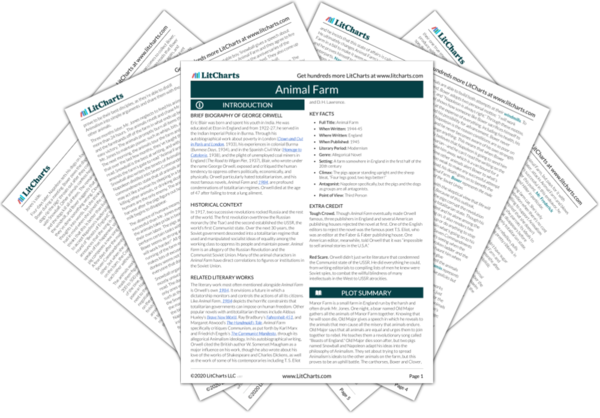While Animal Farm condemns all forms of totalitarianism, it’s most explicitly a bitter attack on the Soviet Union. Though Orwell supported the ideals of socialism, he strongly opposed the Soviet Union’s descent into totalitarianism under Stalin in the decades before and during World War II. Animal Farm satirically attacks the Soviet Union by mirroring many events from Soviet history, and though Animal Farm is subtitled “A Fairy Story,” almost nothing that happens in it is at all fantastical; nearly every event, and indeed every character, correlates to a historical event, person, or group of people.
The first portion of the novel has parallels to the final years of the 19th century and the first few decades of the 20th century. Mr. Jones is a parallel to Tsar Nicholas, the final monarch of Russia, whose family was widely seen as decadent and unconcerned with the fact that many Russians at that point were starving and wildly dissatisfied with their rulers. Old Major represents Vladimir Lenin, a Marxist revolutionary who led the Bolshevik Party that ultimately ousted Nicholas during the Bolshevik Revolution of 1917. Like Old Major, Lenin didn’t survive to see his ideals come to fruition; rather, his associate Leon Trotsky, represented by Snowball in the novel, took over and advocated for spreading revolutions all over the world (as when Snowball proposes sending out more pigeons to spread word of the rebellion to neighboring farms) and planned to modernize what, by this time, had become the USSR. Joseph Stalin exiled Trotsky, however, and ultimately assassinated him in Mexico. Stalin, like his literary counterpart Napoleon, didn’t care much for debate, and instead amassed power, developed a totalitarian state, and relied heavily on propaganda to control the population. Events on Animal Farm after Napoleon’s takeover mirror many that happened in the USSR during his rule, including Stalin’s Five Year Plans (the first and second windmills), rebellions on the part of farmers and sailors (the hens’ rebellion), and Stalin’s show trials and executions (the confessions and executions of the four young pigs and other animals). The novel ends with a parallel to the Tehran Conference in 1943, during which Winston Churchill of Great Britain, Franklin D. Roosevelt of the US, and Stalin met to discuss how to achieve peace after World War II, an event that Orwell mocks when both Mr. Pilkington (the Allies) and Napoleon cheat at cards, presciently predicting what would ultimately develop into the Cold War between the US and the USSR.
Notably, Animal Farm focuses intently on the inner monologues and experiences of those who don’t have much or any power, such as Clover and Boxer (who symbolize female and male peasant workers, respectively). Through Clover’s experience in particular, Orwell paints a picture of 40 years’ worth of history that was alternately, and at times simultaneously, hopeful and horrific—and often hungry and scary for those without power, education, or the means to escape—as Mollie, the cat, and the real-life middle class do and did. Further, Orwell doesn’t stop at vilifying the USSR alone. Instead, he suggests that capitalists who got rich doing business with the USSR, as represented by Mr. Whymper, and ultimately, the allies who gave Stalin a legitimate place on the world stage, as represented by the farmers’ visit to Animal Farm at the end of the novel, are also to blame for what happened. Through this, Orwell cautions against romanticizing any aspect of Russian or USSR history, as even though he may have sympathized with the ideals that drove the revolution to begin with, he makes it very clear that the fruits of the revolution are nothing anyone should aspire to. Rather than helping anyone, the revolutions actually led to starvation, fear, death, and trauma of all sorts.
The Soviet Union ThemeTracker

The Soviet Union Quotes in Animal Farm
Chapter 1 Quotes
“Why then do we continue in this miserable condition? Because nearly the whole of the produce of our labour is stolen from us by human beings.”
Chapter 5 Quotes
At this there was a terrible baying sound outside, and nine enormous dogs wearing brass-studded collars came bounding into the barn. They dashed straight for Snowball, who only sprang from his place just in time to escape their snapping jaws.
Chapter 7 Quotes
If a window was broken or a drain was blocked up, someone was certain to say that Snowball had come in the night and done it, and when the key of the store-shed was lost, the whole farm was convinced that Snowball had thrown it down the well. Curiously enough, they went on believing this even after the mislaid key was found under a sack of meal.
Chapter 10 Quotes
The creatures outside looked from pig to man, and from man to pig, and from pig to man again; but already it was impossible to say which was which.











